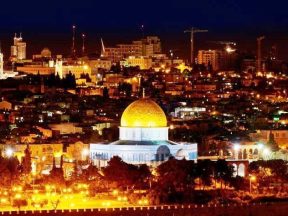India. Saving an Endangered Language.
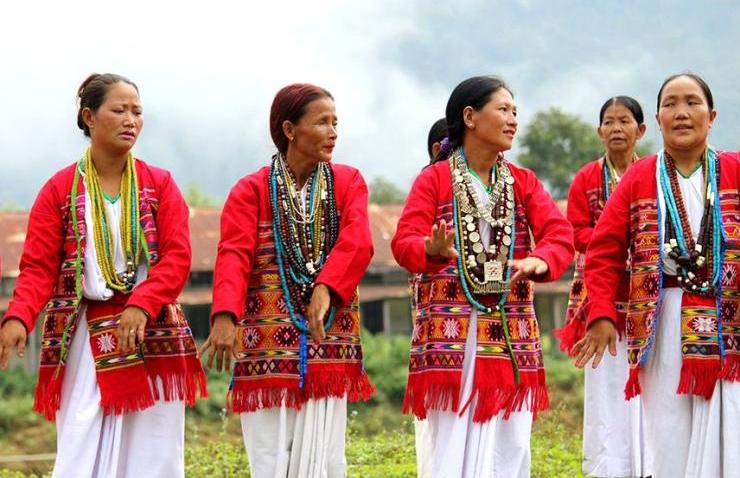
Hrusso Aka, an indigenous language in northern India, was on the verge of extinction. A Jesuit, whose mother tongue was Konkani, a language along the western coast of India, came to help the Hrusso Aka natives save their dying tongue.
A tribal language in northern India was moving toward extinction in the late 1990s. In 1999, a 25-year-old Jesuit decided to live among its speakers to learn their tongue and help them prevent its slide
down the deep pit of oblivion.
The Hrusso Aka language is spoken by the indigenous people in the West Kameng district of Arunachal Pradesh. It is an ethnically diverse state, shares international borders with Bhutan in the west, and Myanmar in the east. In the north, it shares over 1,000 kilometers of disputed border with China. The Hrusso Aka people don’t look like the Indians; they look more like the Mongols.
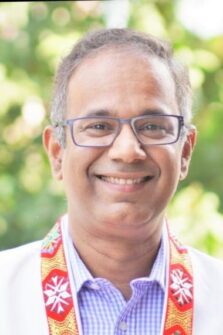
Father Vijay D’Souza, Director of North Eastern Institute of Language and Culture in Guwahati. (Photo Campion Hall)
When China invaded Tibet in 1950, some Tibetans fled to where the Hrusso Aka people thrive today. According to an account, Hrusso Aka women had a practice of smearing their face with paints to make themselves look undesirable–a way to protect themselves from men from the outside. Because of this practice, the British and the Assamese called them Aka, which means painted in Assamese, a language in the northeastern Indian state of Assam.
“The Hrusso Akas has a population of about 10,000” said Father Vijay D’Souza, Jesuit, who has been working to preserve the language for many years. He is the Director of North Eastern Institute of Language and Culture in Guwahati. He has a doctorate degree in Linguistics from the University of Oxford. He’s also an associate member at the University of Oxford’s Faculty of Linguistics.
“But according to our estimate, – he continued – only about 4,000 to 5,000 people are speaking the language today. So, it’s quite endangered that way.” A language is considered endangered when the young are no longer learning to speak it because the parents have stopped passing it on to them, D’Souza explained.
That is what is happening in Hrusso Aka villages. “People stop passing on their own language to their children when they feel speaking that language is not to their advantage. Parents think their children should speak Hindi, or English, in our context here. In other parts of the world, it may be Spanish or French,” the priest pointed out.
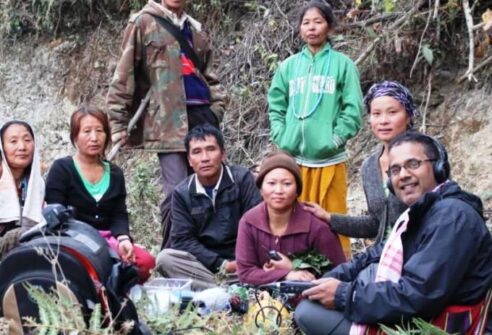
Father D’Souza in conversation with local people. (Photo Campion Hall)
A mother tongue would run the risk of getting endangered when its people start thinking that speaking in a foreign language would promise them a better future, the linguist Jesuit pointed out. “I think that is one of the major reasons why a language is facing the threat of extinction,” he said. But a language, especially a minority one, gets endangered not only by the prospects of better future of its speakers, but also by the government’s idea of achieving national integration that views minority languages as a threat to that goal, he noted.
“Sometimes the language is banned in schools. Parents may want to pass it on to their children, but the school says you need to speak only in this particular language.” Father D’Souza said. “
According to a National Geographic post on April 16, 2018, some 230 languages worldwide went extinct between the period of 1950 and 2010. “Children become smarter when they know more languages,” the priest said. “Children can easily learn more than one language.”
Prestige Languages
English is a prestige language in India. People who speak English are regarded as educated. “We can’t deny English is required for the children’s future, for them to connect to the global scenario and be part of the global community,” he said. “But there’s an erroneous belief that if you speak in your mother tongue it will hamper your ability to speak English, which is not true.”
India’s former Prime Minister PV Narasimha Rao had spoken the languages of Urdu, Marathi, Hindi, Telugu, and English. Rao, an Indian prime minister from the non-Hindi speaking region of South India, spared his nation from an economic collapse by launching and accelerating free-market reforms. Gandhi, the Great Soul of India himself, was a polyglot who had spoken in Gujarati, English, Urdu, Hindi, Tamil, and even the very old Sanskrit.
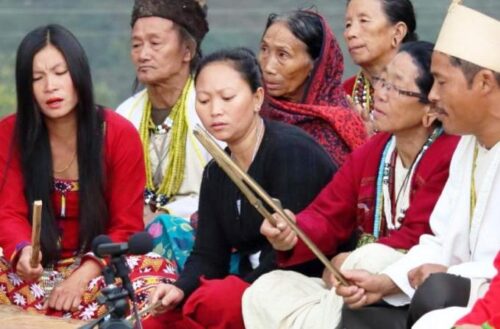
The Hrusso Akas has a population of about 10,000, but only about 4,000 to 5,000 people are speaking the language today. (Photo Campion Hall)
Aside from English, the Hrusso Aka language is also threatened by Hindi, one of the official languages in India, D’Souza said. Hindi has become the lingua franca among Indians who speak different languages.
India has 122 major languages and 1,599 other languages, according to the Census of India of 2001. Hindi enjoys prestige among non-Hindi Indians and is massively promoted on TV. Father D’Souza has also observed many young Indians have become fond of speaking in Hindi and are now ashamed of their own mother tongue. They even teach Hindi to their children.
Preserving A Language
D’Souza gives the credit for saving the language to its native speakers. The first step he took to help them save it was “to learn the language.” In the evening, D’Souza went around collecting words. He got fascinated with the “very complex sound structure of the language.”
“We published the first ever book in Hrusso Aka language in 1999,” he said. “The people became very excited because their language has been written for the first time.” It was a hymn book. In 2017, D’Souza developed the language’s alphabet and subsequently modified it in collaboration with a team of Hrusso Aka native speakers. In the same year, they also founded a literature team “that became the Hrusso Aka language academy in 2021.”
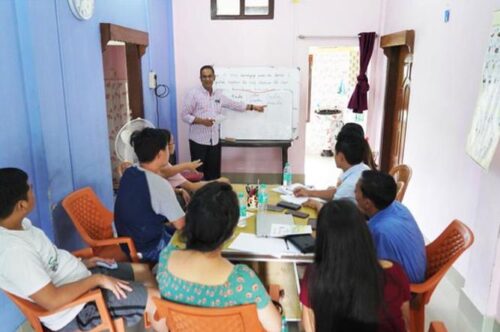
Father D’Souza with his team at the North Eastern Institute of Language and Culture in Guwahati.
“The most important measure is to spread awareness among the people about language endangerment,” – he said -. Unless the native speakers themselves wake up to this reality, we from the outside can do a little to ensure the language’s survival.”
The most important measure in ensuring the language’s survival is capacity-building, and it is bearing fruit now, D’Souza noted.
“When people realize the beauty of their language and start composing poems, stories, and helping out in making dictionaries and textbooks, there’s an involvement of many people, and the language has a better chance of survival.”
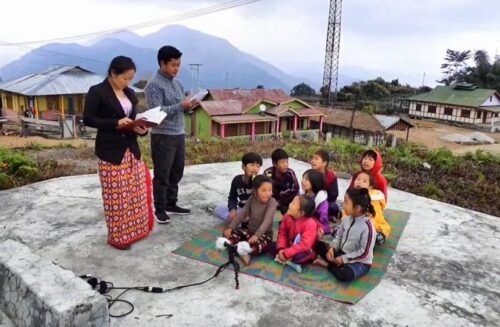
“Children can easily learn more than one language.” (Photo Campion Hall)
To ensure the language’s survival, D’Souza and his team of native speakers have also made three language documentations and have archived 150 hours of recordings, which were stored permanently at online sites. “If the language becomes dormant, people can go back 50 to 100 years to those deposits,” he said.
The third measure in ensuring the language’s survival involves composing literature, like children’s rhymes, poetry, church songs, and even secular songs, D’Souza added.
The Hrusso Aka Language Academy has been producing social media content. Its Facebook news channel, the first ever in the language, summarizes world and local news in its mother tongue.
“We just produced it experimentally and we started getting 2,000 views – D’Souza said -. For a community of 10,000 people, 2,000 views for a story is viral. We are very proud that news is now available in their own language.” (Open Photo: Hrusso Aka women in their traditional dress. WM)
Oliver Samson



